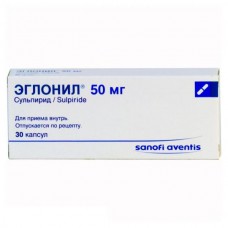Expiration date: 11/2027
Structure and Composition:
The capsules. One capsule contains 50 mg sulpiride
in blister 10 pcs. in box 3 blisters.
Tablets. One tablet contains 200 mg sulpiride
in blister 12 pcs. in one blister box.
The solution for intramuscular injection. One vial contains sulpiride 100 mg
card of 6 vials in the box 1 blister.
Pharmachologic effect:
Blocks dopamine receptors.
Pharmacokinetics:
Following parenteral administration of 100 mg Cmax (2,2 mg / L) was determined at 30 min after oral administration of 200 mg (0.73 mg / l.) - Bioavailability after 4.5 hours after oral administration is 25-35% (perhaps vary widely in individual patients). Easily it penetrates all organs, especially the liver rapidly and kidney, brain tissue slower (major amount of concentrates in the pituitary gland). Binding to plasma proteins - 40%. T1 / 2 is about 7 hours. Virtually no biotransformation. Total Cl - 126 ml / min. Elimination occurs mainly by the kidneys (92% of the administered dose) through glomerular filtration and secretion of a small portion (about 1% of the daily dose) is excreted in breast milk.
Description of the pharmacological actions:
In small doses, acting at the level of the central dopaminergic receptors, providing the releasing action. At doses above 600 mg / day reduces the productive symptoms (proper antipsychotic effect).
Indications:
Acute and chronic psychosis (confusion, delirium, confusion, agrammatism, abulia), schizophrenia, neurotic state, accompanied by inhibition psychosomatic symptoms (especially for stomach ulcers and duodenal ulcers and hemorrhagic rektokolite).
Contraindications:
Hypersensitivity suspected pheochromocytoma.
Application of pregnancy and breastfeeding:
With prolonged use of high doses (over 200 mg / day) in newborns sometimes marked extrapyramidal syndrome. Therefore, the need for treatment in pregnant and lactating women is recommended to reduce the dose and reduce the duration of treatment.
Side effect:
With prolonged use at high doses may sometimes be confusion, drowsiness, hyperprolactinemia, amenorrhea, galactorrhea, gynecomastia, impotence, frigidity, weight gain, early (spastic, torticollis, oculomotor disturbances, spasm of the masticatory muscles) and late dyskinesia, extrapyramidal disorders, orthostatic hypotension , neuroleptic malignant syndrome (hyperthermia).
Drug Interactions:
Weakens the effect of levodopa, increases the severity of lowering blood pressure in the background antihypertensive drugs incompatible with alcohol, and others. Drugs depressing the central nervous system (mutual reinforcement sedative properties).
Dosage and administration:
Psychosis: in / m - 200-800 mg / day for 2 weeks inside - with negative symptoms - at 200-600 mg / day, with productive symptoms - at 800-1600 mg / day, with motor inhibition and psychosomatic disorders - 100-200 mg / day, gastric ulcer and duodenal ulcer - 150 mg / day for 4-6 weeks. Babies (preferably in the form of oral solution) - 5-10 mg / kg / day (1 teaspoon - 4 drops of 25 mg - 1 mg).
Precautionary measures:
Be wary appoint patients with renal insufficiency, epilepsy, Parkinson's, the elderly and newborns during the drivers of vehicles and people skills relate to the high concentration of attention.




